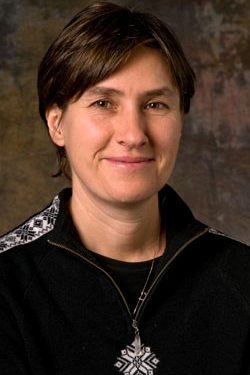Laura Crisa, MD, PhD
Email: lcrisa@uw.edu
- Associate Professor of Medicine, Division of Metabolism, Endocrinology and Nutrition
- Home Department Website: https://endocrinology.uw.edu/
Laura Crisa received her MD from the University of Rome in Italy in 1986, Board Certification in Endocrinology and Metabolism in 1989, and PhD in Immunology in 1992. Soon after her medical training, she left Italy to join the laboratory of Dr Aldo Rossini, at the University of Massachussets, Boston, to train as a post-doctoral fellow in the field of Immunology and animal models of Type 1 Diabetes. In 1994 she moved to the Scripps Research Institute, in La Jolla, California, as Senior Research Associate to train further in hemopoiesis and vascular biology, as applied to the biology of pancreatic islet transplantation. At the Scripps Research Institute she was appointed to the faculty in 2002. In 2009 she was recruited as Associate Professor to the Diabetes and Obesity Center of Excellence and the Institute of Stem cell and Regenerative Medicine, both at the University of Washington.
Dr. Crisa serves on study sections in immunology and vascular biology at the American Heart Association, Juvenile Diabetes Research Foundation, and NIH.
Research Interests
Angiogenesis and self-containment of local inflammatory responses are critical to transplant engraftment. A major focus of Dr. Crisa’s research program is to define the developmental requirements and functional characteristics of endothelial cell progenitors of bone-marrow origin and specialized myeloid cell populations recruited at sites of tissue repair. Specifically, cellular and molecular pathways activated in bone marrow-derived vascular cells and myeloid cells, capable of delivering islet’s survival and regenerative signals and/or modifying innate immune responses are the focus of this line of research. Knowledge gained from this research may help to define the transplant microenvironment and specific signaling pathways supporting engraftment of islet tissue and/or regeneration of insulin-producing cells from injured islet cells or their progenitors.
Immune recognition of major hystocompatibility (MHC) antigens on tissue transplants is the primary barrier to allografts acceptance. There are, however, certain Class I MHC antigens that can suppress immune responses. This is the case of human HLA-G. There is extremely low polymorphism of HLA-G in the human population and high expression levels of this molecule on the trophoblast, the fetal tissue at the maternal-fetal interface, has been shown to be involved in the down-regulation of cytotoxic NK and T cell immune responses. Work in Dr. Crisa’s laboratory has shown that this unique HLA molecule is also expressed in a subset of human thymic epithelial cells and in pancreatic islets suggesting that thymic education and peripheral presentation of this HLA determinant may also sustain immunoregulatory mechanisms in post-natal life. To address this possibility, SCID mouse models reconstituted with a human immune system and transgenic models are used to determine whether engineering high levels of HLA-G expression in thymic and islet tissues can be used as a strategy to modify human alloreactive T cell repertoires and prevent transplant rejection.
Dr. Crisa’s research has been and/or is currently supported by the National Institute of Health, Juvenile Diabetes Foundation, and American Heart Association.
How can this research help people with diabetes?
Degenerative diseases such as diabetes mellitus are severely debilitating conditions that would significantly benefit from new tissue regenerative treatments. Understanding how vascular and specialized cells of the immune system could be manipulated to trigger and sustain regeneration of injured pancreatic islets may lead to uncover new therapeutic strategies for diabetic patients. In addition, defining the survival and immune-protective signals that these cell types may deliver in the contest of islet transplants will allow to discover new ways to promote engraftment and avoid immune rejection of islet tissue transplants

